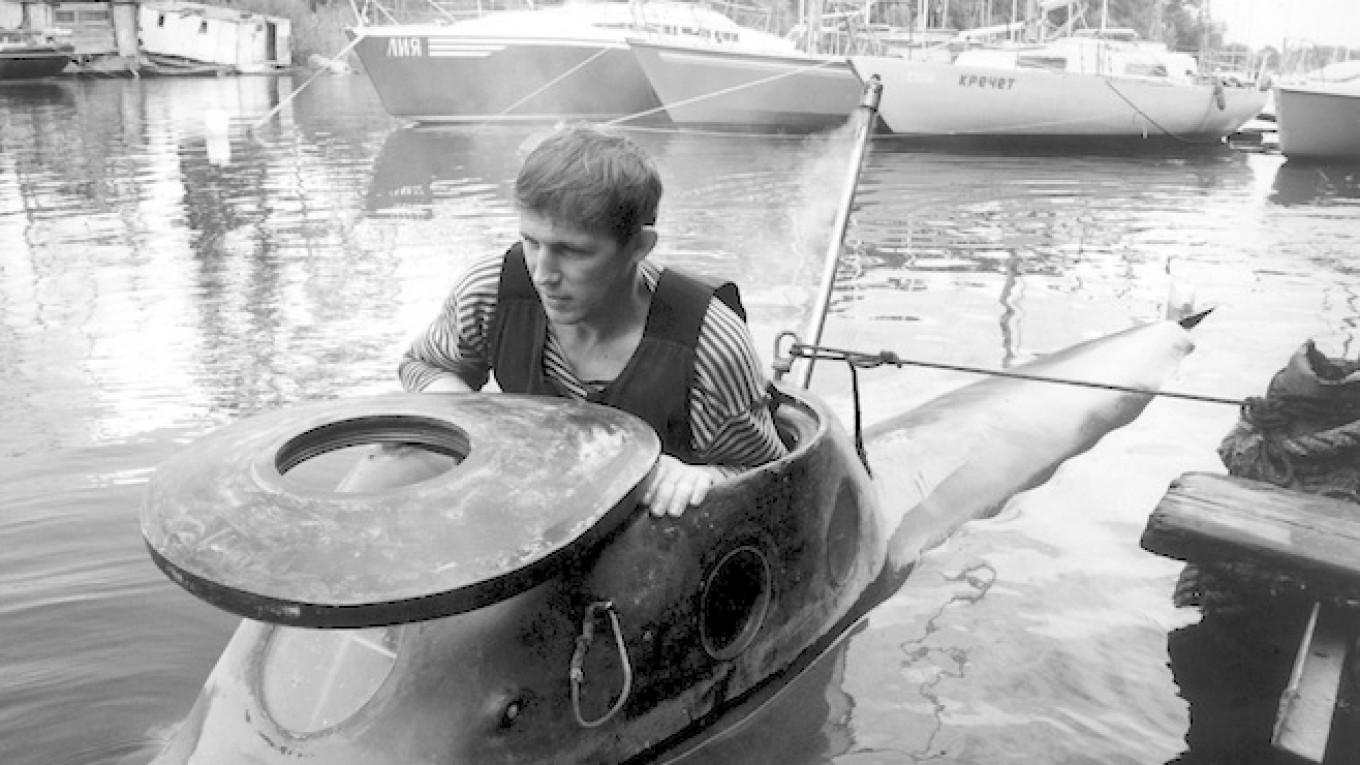This article was taken from the Moscow Times archive and was first published on Sept. 8, 2000.
ST. PETERSBURG — Mikhail Puchkov certainly does not look like a spy as he sips his tea and smokes a cigarette, sitting with his friends in front of the little metal huts of a St. Petersburg yacht club.
But back in 1987, when the police discovered Puchkov floating on the Neva River in what is probably the world's smallest submarine, they were certain that he was involved in espionage.
"The KGB arrived to arrest me," Puchkov said. "They searched my whole submarine for photographs and sent boats to the Gulf of Finland to find 'accomplices.'"
Eventually, however, they concluded that Puchkov — who had guided his one-man sub to the Neva all the way from the Tosna River, near Ryazan, nearly 200 kilometers southeast of Moscow — was no spy.
Unlike most people, who find the idea of deep-water submersion claustrophobic and potentially perilous — especially in the wake of August's Kursk submarine disaster — the 40-year-old Ryazan native says there is nothing more liberating than going down and under.
"It's true that everything looks the same underwater," Puchkov said. "But it's the feeling of going deep down under the water, overcoming the natural capacities of the human body, which is incredible. No one sees you, no one hears you and there are no laws that restrict your movement — now that's freedom."
Peaceful as that seems, it sounds like a drill penetrating a wall when Puchkov starts the motor of his self-constructed podvodnaya lodka.
Above water, the 5-meter-long minisub works using a standard gasoline motor and a global positioning system. When descending into the depths, Puchkov uses a compass and maps and switches to an electric motor powered by a battery. "I used to pedal for electricity, but that was too exhausting," he said.
Descending to a maximum depth of 10 meters, Puchkov's 1.8-ton sub operates at a top speed of 8 kilometers per hour. Puchkov, who says his sub can travel up to 400 kilometers at a stretch, enjoys taking his "toy" out to the small islands surrounding Kronshtadt in the Gulf of Finland.
"It's wonderful there," he said. "The islands have small forts and no one is there, so I don't get in trouble when I open my hatch."
Still, excursions can be risky. Once while touring around the Gulf of Finland, a severe storm pushed Puchkov's sub around the sea like an empty beer can, finally running it aground on a sandy beach.
And when the sea is rough and the smell of the fuel gets too intense, he sometimes becomes seasick, Puchkov admitted. But the seasoned sailor likes to take risks. "The further out you go, the more frightening it gets," he said with a smile. "That's the thrill."
Puchkov, who has also tried his hand at building a helicopter, spent six years constructing his sub after leaving the army in 1981. Asked why he did so, he replied: "People always have to understand everything and ask for my reasons, but I just like it — that's it."
After his unpleasant brush with the KGB in 1987, the secret service organization changed its tack and sent him off for studies at a Nautical Institute in St. Petersburg."
Did they ever try to hire him? "Yes, but I refused — you get no money there," Puchkov said.
A Message from The Moscow Times:
Dear readers,
We are facing unprecedented challenges. Russia's Prosecutor General's Office has designated The Moscow Times as an "undesirable" organization, criminalizing our work and putting our staff at risk of prosecution. This follows our earlier unjust labeling as a "foreign agent."
These actions are direct attempts to silence independent journalism in Russia. The authorities claim our work "discredits the decisions of the Russian leadership." We see things differently: we strive to provide accurate, unbiased reporting on Russia.
We, the journalists of The Moscow Times, refuse to be silenced. But to continue our work, we need your help.
Your support, no matter how small, makes a world of difference. If you can, please support us monthly starting from just $2. It's quick to set up, and every contribution makes a significant impact.
By supporting The Moscow Times, you're defending open, independent journalism in the face of repression. Thank you for standing with us.
Remind me later.






